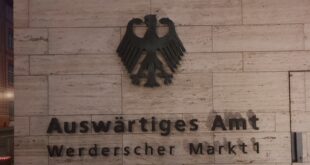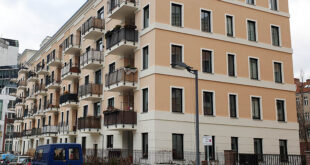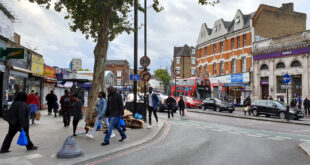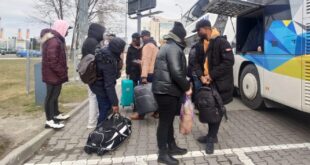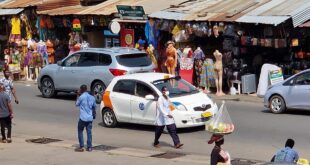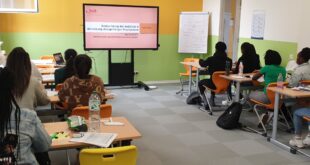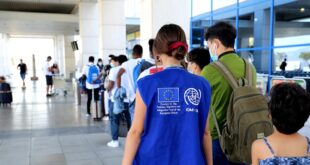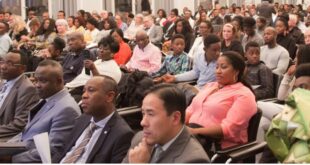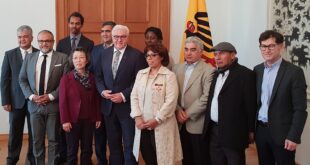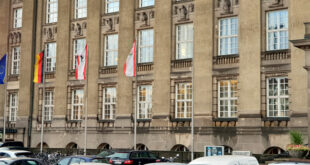Estimates of the number of Ghanaians living outside their homeland range from one to three million out of a general population of about 30 million. Ghanaians in Germany are reputed to form the second largest of the country’s diaspora populations in Europe, after the United Kingdom. Journalist, translator and community activist Sam Atsu Nove*, who first arrived in Germany in 1972, writes on the history and state of Ghanaians in Germany. Part I
———————————————–
Facts and Figures
Official German statistics put the number of Ghanaians in Germany in 2017 at 33,900. Migration experts raise that figure to around 60,000 today and consider it to be appropriate. The German Federal Statistics Office understandably counts only Ghanaians without German citizenship. Persons of Ghanaian origin who acquire citizenship through birth or naturalisation cease to be Ghanaians in official records. To the Ghanaian community, Ghanaians include all Ghanaians born at home and abroad, whatever their current legal status.
The early Ghana-German contacts
Traditionally, Ghana and Germany have been in contact before the then Gold Coast became independent in 1957. Today’s Volta Region of Ghana, for instance, was part of the German colony of Togo before World War 1. The Ewe language, spoken both in Togo and the Volta Region, was put into a written form by the combined efforts of the German colonial administration and the Bremen Mission, which still maintains good working contact with the evangelical churches in Togo and Ghana.
Without going into detail, it suffices to say that there have been cordial relations forged between Germany and Ghana within the past 60 years, which partly sustained Ghanaian migration in its different forms to Germany.
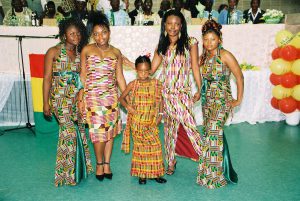
How it all started after World War II
Patterns of migration of Ghanaian citizens to Germany varied according to changes and developments within the two countries in the course of the years.
The initial German invitations to Ghanaian students into Germany to take advantage of “educational assistance” starting in the 1950s were to some extent dictated by the Cold War situation of the period. The Cold War constraints prompted the two German states at the time to launch a hectic search for friends to support their specific causes for international recognition.
Ghana was important in that diplomatic game for two reasons. It was the first African country south of the Sahara to gain independence. Far more important for Ghana’s position was Dr Kwame Nkrumah’s African unity and Pan-African rhetoric, which sent uncertain signals to both Cold War camps as to the possible geopolitical weight of the emerging African continent.
The cordial welcome accorded to Ghanaian students from the 1950s by the German Democratic Republic (GDR) and West Germany, therefore, had nothing altruistic about it. Of course, all the new independent African countries accepted the friendly offer thankfully.
Already in 1957, the year of independence, 44 Ghanaian students were registered in West German universities. The GDR even recruited its first Ghanaian trainees in anticipation of independence as far back as 1951. A contribution to the anti-colonial struggle, so to say.
The West German policy of allowing Ghanaians and other Africans south of the Sahara only to pursue academic studies and return home immediately to help to “develop” their country, positively coincided with official Ghanaian government policy of the time.
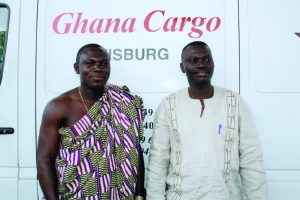
Ghana Student Unions
A short look at Ghanaian students in Germany, their organisational forms and their activities between 1960 and the early 1980s indicate that the positive educational lessons at home were brought with them abroad.
The main forms of organisation of Ghanaian students at the time were the local student unions in the various university cities and towns. The first Ghana student unions were already established in the 1960s. The local associations in the university towns and cities joined to form an umbrella organisation called the Union of Ghanaian Students in Germany (UGSG).
Ghana student unions also existed in European countries such as the Netherlands, Great Britain and in the USA. The national European associations put themselves under the umbrella of the National Union of Ghanaian Students in Europe (NUGSE). NUGSE was in close contact with the National Union of Ghanaian Students or NUGS in Ghana, so that nothing happening at home was hidden from the organised Ghanaian students abroad.
Like the national associations in their countries of study, NUGSE met at an annual delegates’ congress in a chosen European city once a year to deliberate on issues and problems facing Ghanaians in Europe and at home in Ghana.
It is important to note that the Ghana student unions, from local to European levels, were not only cultural and self-help organisations as normally stated in the official constitutions. They were self-help student associations all right, but also highly politicised organisations which constantly kept an eye on what was happening at home.
The delegates’ congress, usually two days long and attended by representatives of national or European unions, always ended with a resolution on the situation in the host country, at home in Ghana or both. Two such resolutions of the 12th Annual Congress of the UGSG in 1983 in West Berlin demonstrate how closely attached to events at home the Ghanaian student unions were, or felt to be.
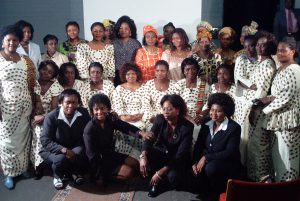
The first resolution was a recommendation on the “National Reconstruction Levy” to help to reduce suffering owing to the economic crisis at home. The second one concerned the total dissatisfaction of Ghanaians abroad with their government giving in to the dictates of the World Bank and International Monetary Fund (IMF).
Such an extremely explosive document as the 1983 UGSG resolution from Germany to the Ghanaian government could as well have come from students of Greece or Portugal 30 years later in 2013, condemning the EU and the World Bank for trying to stifle their countries through austerity measures before helping their economies.
The principles on which the Ghanaian local, federal or European associations functioned were based on political tenets from home. The unions had no religious, ethnic or other sectarian affiliations, just as the Constitution of Ghana forbids national political formations to do.
The close co-operation with Ghanaian embassies had limits which the diplomatic representatives respected. Embassy officials were no union members. At delegates’ conferences, invited officials gladly answered questions on behalf of the government, but had no voting rights. Pan-African involvement of the Ghanaian unions and Ghanaian students were a matter of principle. Ghanaians were very active members of the African Students Union, which also started in the 1960s.
Ghanaian ethnic organisations started springing up in the late 1980s when the student unions were disintegrating, partly because some Ghanaians started playing partisan politics with the unions. It became more and more difficult to formulate communiqués based on Ghanaian common interest. Moreover, the local unions could no longer cater properly for the increasing number of Ghanaian arrivals, mainly asylum-seekers.
Attempts to harness all Ghanaians in the individual localities under new and functioning organisations, for instance by appropriately removing “student” from the names of the Ghana unions or associations in areas with lesser numbers of or no students, did not go far in solving the problem. New local unions encompassing all Ghanaians emerged to replace the student unions, but the German-wide networking of the previous era failed to function.
* This article, originally published in August 2017, was updated on 10 July 2020. The author, Sam Nove, who was born on 21 September 1947 in Agotime-Kpetoe district of the Volta Region of Ghana, died on 9 March 2020 in Berlin, Germany. A Pan-Africanist and passionate promoter of Ghana’s traditions and culture, Nove was a pioneer journalist focusing on the African community in Germany. The article is published in memory of Sam Nove
 THE AFRICAN COURIER. Reporting Africa and its Diaspora! The African Courier is an international magazine published in Germany to report on Africa and the Diaspora African experience. The first issue of the bimonthly magazine appeared on the newsstands on 15 February 1998. The African Courier is a communication forum for European-African political, economic and cultural exchanges, and a voice for Africa in Europe.
THE AFRICAN COURIER. Reporting Africa and its Diaspora! The African Courier is an international magazine published in Germany to report on Africa and the Diaspora African experience. The first issue of the bimonthly magazine appeared on the newsstands on 15 February 1998. The African Courier is a communication forum for European-African political, economic and cultural exchanges, and a voice for Africa in Europe.




